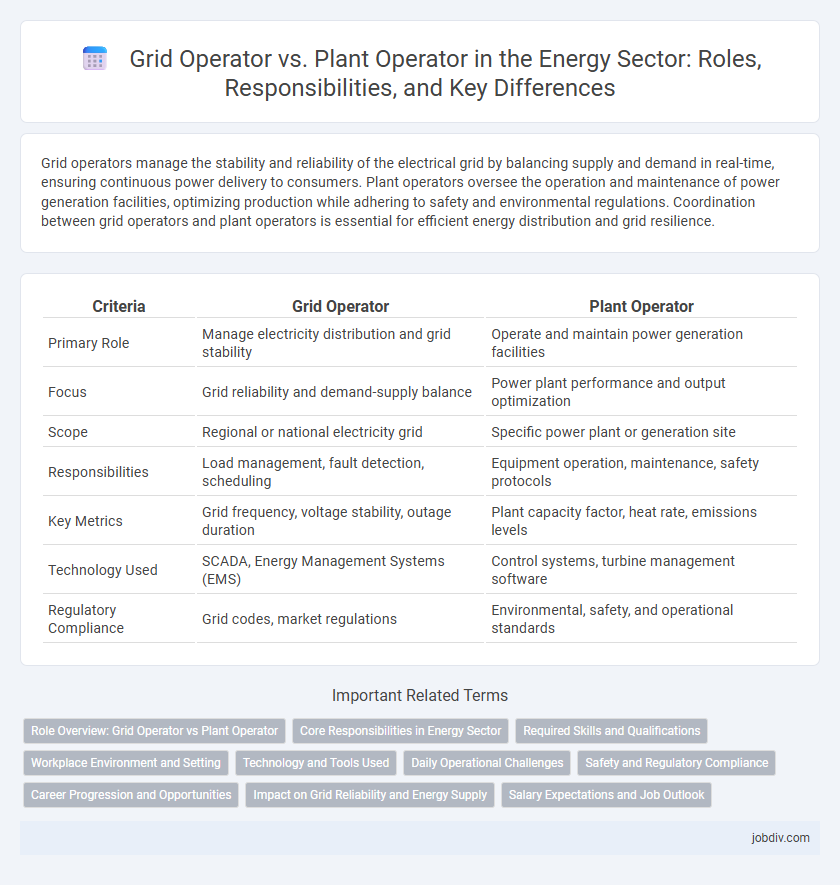Grid operators manage the stability and reliability of the electrical grid by balancing supply and demand in real-time, ensuring continuous power delivery to consumers. Plant operators oversee the operation and maintenance of power generation facilities, optimizing production while adhering to safety and environmental regulations. Coordination between grid operators and plant operators is essential for efficient energy distribution and grid resilience.
Table of Comparison
| Criteria | Grid Operator | Plant Operator |
|---|---|---|
| Primary Role | Manage electricity distribution and grid stability | Operate and maintain power generation facilities |
| Focus | Grid reliability and demand-supply balance | Power plant performance and output optimization |
| Scope | Regional or national electricity grid | Specific power plant or generation site |
| Responsibilities | Load management, fault detection, scheduling | Equipment operation, maintenance, safety protocols |
| Key Metrics | Grid frequency, voltage stability, outage duration | Plant capacity factor, heat rate, emissions levels |
| Technology Used | SCADA, Energy Management Systems (EMS) | Control systems, turbine management software |
| Regulatory Compliance | Grid codes, market regulations | Environmental, safety, and operational standards |
Role Overview: Grid Operator vs Plant Operator
Grid operators manage the overall stability and reliability of the power transmission network, coordinating electricity flow between power plants and end-users while balancing supply and demand in real-time. Plant operators oversee the daily operations of power generation facilities, ensuring optimal performance, maintenance, and compliance with safety and environmental regulations. Both roles are crucial for maintaining uninterrupted energy supply, with grid operators focusing on system-wide coordination and plant operators on generation site management.
Core Responsibilities in Energy Sector
Grid operators manage the transmission network, ensuring real-time electricity flow and grid stability by balancing supply and demand across regions. Plant operators oversee the operation and maintenance of power generation facilities, optimizing output and ensuring equipment reliability. Both roles are crucial for seamless energy delivery and system resilience in the power sector.
Required Skills and Qualifications
Grid operators require strong skills in electrical grid management, real-time system monitoring, and emergency response protocols, often holding certifications in power systems and grid reliability. Plant operators must have expertise in mechanical and electrical equipment operation, process control, and safety regulations, typically possessing technical diplomas or degrees in energy production fields. Both roles demand proficiency in SCADA systems, problem-solving abilities, and adherence to industry standards for efficient and safe energy distribution.
Workplace Environment and Setting
Grid operators manage the energy distribution network from control centers equipped with advanced monitoring systems to ensure grid stability and reliability. Plant operators work directly at power generation facilities, often in environments featuring heavy machinery and real-time operational controls, requiring hands-on technical expertise. Both roles demand precision and quick decision-making but differ significantly in their workplace settings--control rooms versus onsite plants.
Technology and Tools Used
Grid operators utilize advanced SCADA systems and real-time data analytics platforms to monitor and control power flow across extensive transmission networks, ensuring grid stability and reliability. Plant operators focus on specialized control systems like distributed control systems (DCS) and programmable logic controllers (PLC) to manage individual power generation units efficiently, optimizing operational parameters and maintenance processes. Integration of IoT sensors and predictive maintenance software enhances decision-making accuracy for both operators, improving overall energy production and distribution efficiency.
Daily Operational Challenges
Grid operators face the continuous challenge of balancing supply and demand in real-time to maintain grid stability and prevent blackouts. Plant operators manage the daily performance and maintenance of energy generation units, ensuring optimal output while minimizing downtime. Both roles require precise coordination to handle unpredictable variables such as fluctuating renewable energy inputs and equipment failures.
Safety and Regulatory Compliance
Grid operators ensure the stability and reliability of the entire electrical network by managing power flow and responding to system disturbances, prioritizing safety protocols and adherence to regulatory standards across regional grids. Plant operators focus on the safe and efficient operation of individual power generation facilities, complying with environmental regulations and industry safety guidelines to prevent accidents and maintain optimal plant performance. Both roles are critical for maintaining regulatory compliance and safeguarding the energy infrastructure from operational and safety risks.
Career Progression and Opportunities
Grid operators manage the stability and reliability of electrical networks, requiring expertise in real-time system monitoring, load balancing, and emergency response, which creates career growth opportunities in grid management and smart grid technology. Plant operators focus on the operation and maintenance of power generation units, developing skills in mechanical, electrical, and control systems, leading to advancement roles in plant management or technical specialist positions. Both career paths offer progression into senior operational leadership, systems engineering, and regulatory compliance roles within the evolving energy sector.
Impact on Grid Reliability and Energy Supply
Grid operators manage the overall electricity network, ensuring real-time balance between supply and demand to maintain grid reliability and prevent blackouts. Plant operators oversee the performance and output of individual power plants, directly influencing energy supply consistency and responsiveness to grid needs. Effective coordination between grid and plant operators enhances system stability, optimizes energy distribution, and supports integration of renewable resources.
Salary Expectations and Job Outlook
Grid operators typically command salaries ranging from $60,000 to $90,000 annually, reflecting their critical role in managing electricity flow and maintaining grid stability. Plant operators usually earn between $55,000 and $85,000 per year, with variations based on the plant type, such as renewable energy facilities often offering competitive pay. Job outlook for grid operators is expected to grow by approximately 5% over the next decade due to increased grid modernization, while plant operator employment remains steady, driven by the ongoing demand for energy production and maintenance.
Grid Operator vs Plant Operator Infographic

 jobdiv.com
jobdiv.com